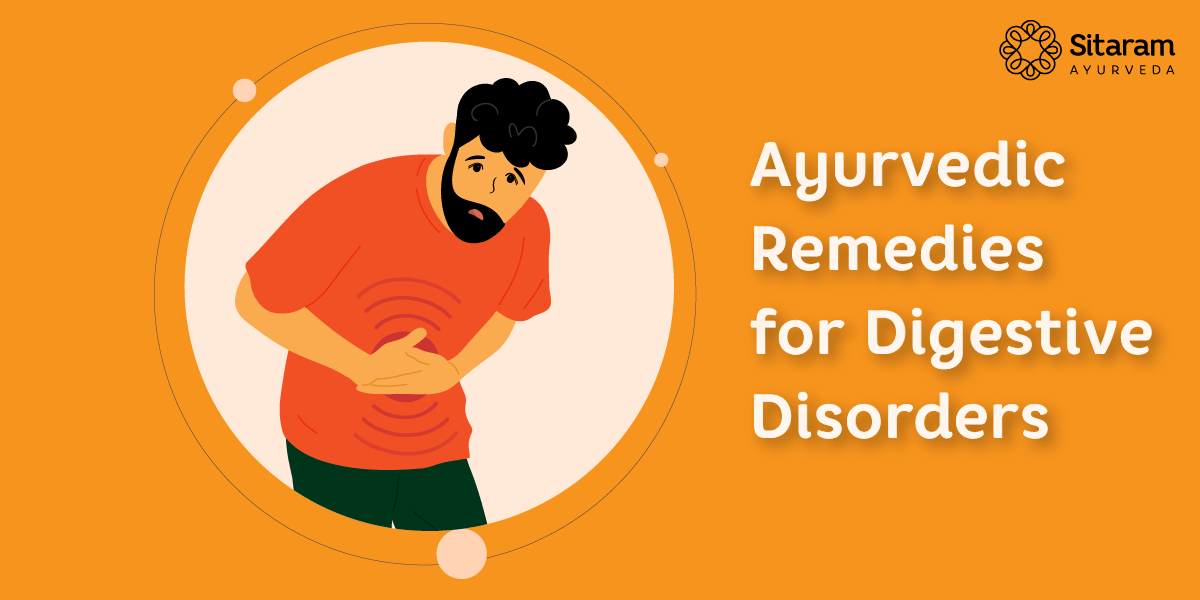Ayurvedic Remedies For Digestive Disorders

What is Digestion?
Digestion is the breakdown of food into smaller components to absorb into the bloodstream.
What is the Digestive System?
The digestive system consists of the gastrointestinal tract (GI tract), liver, pancreas, and gall bladder. In addition, the GI tract includes the mouth, esophagus, stomach, small intestine, large intestine, and anus.
Nerves, hormones, bacteria, blood, and the digestive organs digest the food and the liquids you take.
Importance of Digestion
Digestion is essential for breaking down food into nutrients. Our body uses these nutrients for energy, growth, and cell repair. Therefore, food must change into smaller molecules for the blood to absorb and the cells to carry them throughout the body. Nutrients thus break into carbohydrates, proteins, fats, and vitamins.
A healthy digestive system is essential for strong immunity and a good energy level.
Common Digestive Disorders
Many of us experience digestive problems in some part of our life. Common digestive problems are:
- Indigestion
- Heartburn/ GERD (Gastroesophageal Reflux Disease)
- Chronic diarrhoea
- Chronic constipation
- IBS (Irritable Bowel Syndrome)
- Haemorrhoids
Symptoms of these disorders include
- Bloating
- Diarrhoea
- Gas
- Stomach pain
- Stomach cramps
- Nausea
- Vomiting
- Constipation
Common causes of Digestive Problems
- Unhealthy lifestyle
- Eating low fibre diet
- Food allergy
- Infections
- Stress
- Other systemic disorders
The Ayurvedic approach of Digestion
Ayurveda explains digestion and absorption in terms of Agni. It is explained that Agni is the cause of life, complexion, strength, health, nourishment, lusture, energy, and Prana (power of life).
Ayurveda explains about three types of Agni. They are
- Jataragni (Agni present in stomach and small intestine)
- Bhutagni (Agni from essential five elements)
- Dhathwagni (Agni present in each Dhathus)
Agni varies according to each person;
Samagni – The Samagni digests and assimilates food properly on time. Persons having Samagni are considered healthy.
Vishamagni– This type of Agni occurs in Vatha Dosha predominant persons. This Agni changes between digesting food quickly and slowly.
Tikshnagni– This is the rapid digestion of food, regardless of the type of food. This type of Agni occurs in Pitha Dosha predominant person.
Mandagni– This is a state of slow digestive power. This type of Agni occurs in Kapha Dosha predominant person.
Ayurvedic Remedies for Digestive Problems
Ayurveda gives much importance to digestive power (Agni). Therefore, correcting Agni is given prime importance to the treatment. So a lot of measures are advised in Ayurveda to protect the Agni.
Ayurvedic remedies include
Proper eating habits:
- Ensure that previously consumed food get digested before having the next meal.
- Take food at the proper time.
- Take food according to the need of the body.
- Try to include all the six tastes (shad rasa) in your daily food
- Try to have hot, fresh food
- Don’t overeat
- Chew properly
- Eat-in a pleasant, quiet atmosphere.
- Try to take dinner 2-3 hours before sleep.
- Take fruits like pomegranate, dried grapes, gooseberries etc.
- Include fibre-rich food in your diet (leafy vegetables)
Drink enough water
Proper sleep
Avoid alcohol and cigarette smoking
Avoid stress
Practicing Pranayama helps to relieve stress
Avoid suppression of natural urges.
Herbs that can include in the diet to avoid digestive problems include
- Sunti (Ginger)
- Jeerakam (Cumin)
- Dhanyakam (Coriander)
- Hingu (Asafoetida)
- Lasunam (Garlic)
- Takram (Buttermilk)
- Jaggery
The use of these herbs improves digestion, absorption, elimination, and tissue metabolism.
Detoxification procedures (Panchakarma treatment)
Panchakarma treatment procedures help you to flush out accumulated toxins or waste materials from your body. Panchakarma includes five detoxification procedures (medicated enema, medicine-induced vomiting, drug-induced purgation, and bloodletting).
Detoxification procedures improve your digestive power. Abhyangam (massage), Sirodhara (pouring of medicated oil over the head) reduce stress and improve the body’s general functioning.
Ayurvedic classical medicine for constipation and indigestion
Dasamoolarishtam, Abhayarishtam, Dhathryarishtam, etc., help to remove constipation and indigestion. As all are self-generated alcoholic preparations and are quick acting.
Ayurvedic classical medicine for diarrhea
Kutajarishtam is one of the effective medicine for diarrhea.
Ayurvedic classical medicine for bloating and gas
Hinguvachadi Choornam, Dhanwantharam Gulika are some of the medicines effective in bloating and gas.
Chavikasavam & Nellikkasavam are also effective in reducing abdominal discomfort.
Ayurvedic classical medicine for improving appetite
Jeerakarishtam, Dasamoolajeerakarishtam, etc., are good appetizers.
The formulation Balamrutham is effective to improve appetite in children.
Importance of Ghrutham (Medicated Ghee)
Ghrutham is one of the effective choices to reduce digestive problems. Dadimadi Ghrutham, Indukantham Ghrutham are some examples.
Proper exercise
Proper exercise improves your digestive power. It increases your absorption and energy.
Yoga
Practicing Yoga techniques can prevent common digestive problems like bloating, gas, acidity, constipation, and loss of appetite.
Some of the Asanas (postures) are
- Pavanamuktha Asanam (wind-relieving pose)
- Paschimothasanam (seated forward bend)
- Surya Namaskaram
“A Healthy outside starts from the Inside“
To buy digestive disorder medicine from Sitaram Ayurveda:


 Sign In
Sign In Cart
Cart